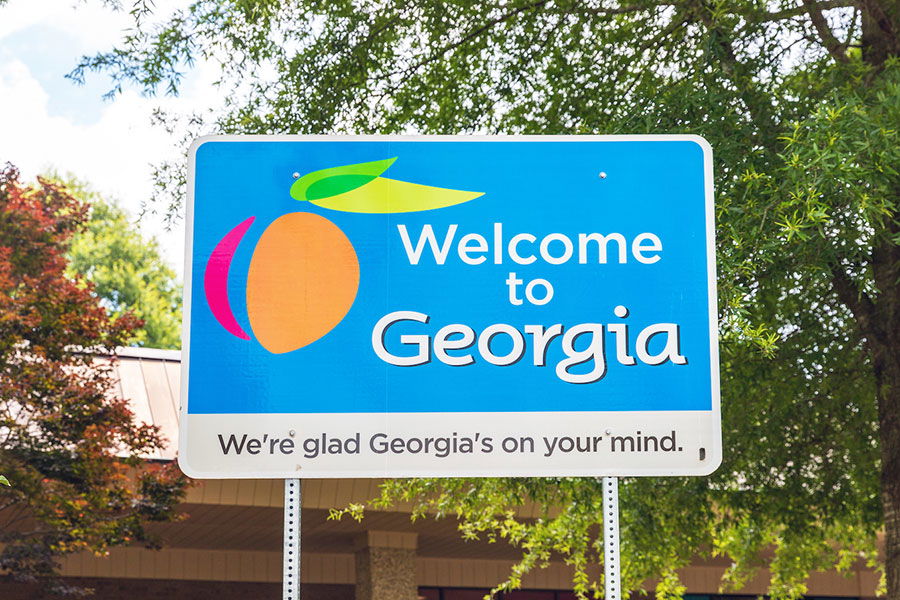Georgia offers an affordable cost of living, top-notch schools and universities, and ample attractions, like the World of Coca-Cola, Forsyth Park, and Atlanta Botanical Garden. It’s also home to a diverse selection of reputable, member FDIC banks for individuals and small business owners.
No matter what your financial needs may be, you’re sure to find a good fit in the Peach State.

14 Best Banks in Georgia
We’ve made finding the best banks in Georgia effortless with our comprehensive list, so let’s dive straight into the options.
1. SoFi
SoFi is a strong option for Georgia residents who prefer online banking with high interest and no hidden costs.
2. Regions Bank
Regions Bank is a regional favorite with over 100 branches across Georgia, including locations in Albany, Alpharetta, Atlanta, Augusta, Columbus, Macon, Marietta, Rome, Savannah, and Valdosta.
3. Current
Current is a mobile-first banking platform that’s accessible to Georgia residents looking for a fast and flexible way to manage money.
4. Georgia’s Own Credit Union
Georgia’s Own Credit Union is one of the largest and most trusted credit unions in the state, with over 30 branch locations across Georgia, including in Atlanta, Savannah, Athens, Augusta, and Marietta.
5. Alliant Credit Union
Alliant Credit Union is an online-only credit union that’s open to residents of Georgia.
6. PNC Bank
PNC Bank has a strong presence across Georgia, with branches in cities like Alpharetta, Atlanta, Augusta, Columbus, Macon, Marietta, and Savannah.
7. United Community Bank
Headquartered in Blairsville, United Community Bank has branches across Georgia, as well as Alabama, Florida, Tennessee, South Carolina, and North Carolina.
8. Renasant Bank
Renasant Bank is based in Mississippi and has many branches in Georgia. It’s one of the top banks that don’t use ChexSystems when you apply for an account.
9. Chase Bank
Chase is the largest national bank in the U.S., with an extensive presence in Georgia.
10. Truist Bank
Truist has physical locations in Georgia cities like Atlanta, Brunswick, Cartersville, and Pooler.
11. Community Bank of Georgia
Based in Baxley, Community Bank of Georgia is a locally owned bank focused on building long-term relationships with customers.
12. Ameris Bank
Ameris Bank is a regional full-service bank with branches in cities like Atlanta, Marietta, Oakwood, Tucker, and Woodstock.
13. Bank of America
Bank of America has a strong presence in Georgia, with more than 70 branch locations across cities like Atlanta, Augusta, Macon, Marietta, and Savannah.
14. Morris Bank
Many residents believe Morris Bank is the best local bank. It has branches in Georgia cities like Dublin, Gray, and Warner Robins.
Types of Georgia Banks
In Georgia, various types of banks cater to the diverse financial needs of its residents. Here, we unpack the distinct features of each to guide you in finding the right fit.
National Banks
National banks have branches and ATMs scattered across the country. These banks typically offer a comprehensive range of products and services, making them a viable choice for individuals and businesses with various financial objectives.
Community Banks
Community banks operate in specific geographical areas, emphasizing personalized customer service to meet the specific requirements of the local populace. In Georgia, you have several commendable community banks to choose from, such as Ameris Bank, Morris Bank, Mountain Valley Community Bank, and Gwinnett Community Bank.
Regional Banks
Regional banks offer a wide array of services, combined with a touch of personalization, fostering strong connections with the communities. Some examples of regional banks in Georgia include Fifth Third Bank, PNC Bank, Regions Bank, and United Community Bank.
Credit Unions
Credit unions stand as non-profit entities, operated and owned by their members, generally offering lower fees and better interest rates on savings and loans. Credit unions prioritize the financial well-being of their members, presenting a community-focused approach to banking.
Some of the top credit unions in Georgia include Delta Community Credit Union, Georgia’s Own Credit Union, Robins Financial Credit Union, and Navy Federal Credit Union.
Online Banks
Online-only banks and neobanks let you bank online and on your phone. Despite lacking physical locations, they provide several advantages, such as lower fees and competitive interest rates.
Some of the best online banks for Georgia residents include SoFi and Upgrade. Both offer a hassle-free and modern banking experience with potential financial perks.
How to Choose the Best Bank in Georgia
The best bank for you depends on how you manage your money and what features matter most. Here are key things to think about before opening an account.
- Accessibility: If you prefer in-person banking, look for a bank or credit union with branches near you. If you’re comfortable banking online, you might get higher savings rates and lower fees with an online-only option. Most banks now offer mobile apps, so you can still handle basic tasks from your phone.
- Fees: Watch out for common fees like monthly maintenance fees, ATM fees, overdraft fees, and wire transfer fees. These can add up quickly if you’re not careful.
- Minimum balance requirements: Some banks charge fees if your account balance drops below a set amount. Make sure the account works with your usual balance so you’re not hit with unexpected charges.
- Product options: Think about what you actually need. Some banks offer rewards on checking accounts, strong savings rates, or small business services. Others focus on the basics. Choose one that matches your financial goals.
- Customer service: Good customer service matters—especially if something goes wrong. Some banks offer 24/7 support through phone, email, or chat. Others are only available during business hours.
- Reviews: Check online reviews on trusted sites like the Better Business Bureau or Consumer Affairs. Pay attention to patterns in complaints. You can also ask friends or family what banks they use and whether they’d recommend them.
- FDIC insurance: Make sure any bank you’re considering is FDIC insured. This protects up to $250,000 per depositor if the bank fails. Credit unions should be insured by the NCUA.
- Extras: Some banks offer added features like overdraft protection, free credit monitoring, or sign-up bonuses. These perks can be helpful but shouldn’t be the only reason you choose a bank.
Bottom Line
Georgia has no shortage of banking options. However, the right one for you depends on numerous factors, like your preferred products and services, the types of account fees you can afford and are willing to pay, and whether you’d like to bank online or in person.
If you’re unsure of which bank makes the most sense for your situation, don’t hesitate to open accounts in a few of them. From there, you can hone in on the best option. Good luck with your search for the ideal bank in Georgia.
Frequently Asked Questions
What are the largest banks in Georgia?
The largest banks in Georgia have the most branches throughout the state. These include Truist Bank (223), Wells Fargo (202), and Bank of America (104). All of these financial institutions are known for their extensive ATM networks and diverse product lineup.
How do I open a bank account in Georgia?
In most cases, you can open a bank account on the bank’s website or mobile app. You’ll likely need to submit a government-issued ID, like a driver’s license or passport, as well as personal information, such as your Social Security number.
Should I open an account at different Georgia banks?
If you have large amounts of cash, you might want to open bank accounts at different banks. This is because the FDIC usually insures up to $250,000 per depositor and bank. This holds true even if you have several bank accounts with the same bank. You may also want to open different accounts if you want to take advantage of different benefits.
How can I easily switch bank accounts in Georgia?
First, gather basic information like your Social Security number or Tax Identification Number. Then, start the application process, fund your new bank accounts, and transfer funds from older accounts. Don’t forget to set up direct deposits and automate recurring payments. Some banks provide switch kits to simplify this process.


















